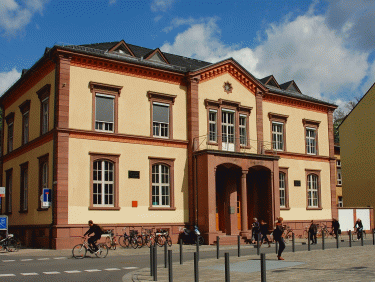Faculty of Modern LanguagesGerman as a Foreign Language / German as a Second Language
Students of the Master’s degree programme in German as a foreign Language/ German as a second language explore the following fundamental questions: How do humans learn language(s)? What are the cognitive prerequisites to learning a language? How can we measure a person’s competence in German as a foreign Language/ German as a second language ? What concrete measures can be used to support language acquisition?
Students of German as a foreign Language/ German as a second language consider these questions, and further issues relating to the acquisition and promotion of German as a foreign Language/ German as a second language . Topics are studied from both a theoretical and practical perspective. It is acknowledged that the promotion of German as a language used in schools is vital for the improvement of the educational perspectives and life chances of pupils from an immigrant background.
The degree programme offers students with a background in education or pedagogy the opportunity to further their language support skills at elementary, primary and secondary level. Such skills enable those working with children to tackle pupils’ language difficulties effectively and adapt concepts relating to pupils’ language skills to students’ individual abilities.

Special Features and Characteristics
The Institute for German as a foreign Language/ German as a second language Philology combines the theory and practice of German as a foreign Language/ German as a second language in a very particular way. Alongside their studies, students undertake voluntary roles in nurseries and primary schools in the local area. These placements enable them to apply theory relating to language development in practice. German as a foreign Language/ German as a second language is also the subject of a series of collaborative projects being conducted with the Heidelberg University of Education and the Heidelberg School of Education. This gives students the opportunity to gain alternative perspectives of the subject, and benefit from the courses and lectures offered by these partner institutions.
Research
Research at the Institute for German as a foreign Language/ German as a second language Philology focusses in particular on the conceptualisation and evaluation of measures designed to improve language acquisition (intervention research e.g. as part of the project “German for Starting School” (Deutsch für den Schulstart), a project focussing on language acquisition in nurseries and primary schools) and on the development of processes for the evaluation of existing language skills. The acquisition and use of German as a foreign Language/ German as a second language are a central concern of research projects conducted at the Institute.
Occupational Areas
The majority of graduates of the degree programme in German as a foreign Language/ German as a second language will pursue employment which involves working with learners with an immigration background to improve their German language skills.
The degree programme therefore prepares students for the following types of employment;
- Implementation and evaluation of measures designed to improve language skills
- Development and continued improvement of language learning materials
- Conceptualisation of further and continued training programmes for professionals working with learners of German as a foreign Language/ German as a second language
- Coordination of funding and training measures in pre-school settings, schools, state agencies and associations
- Research and teaching in second language acquisition, bilingualism and language didactics
Degree variants
Master, consecutive
Learn more
Insights

I studied ‘German as a foreign Language/ German as a second language ’ because supporting the acquisition and development of linguistic competencies was, is and will always be an important objective in our society. In the Master’s programme, the students acquire in-depth knowledge about the second language didactics and have the opportunity to apply that theory during the course of study as a language trainer in kindergartens and primary schools in Heidelberg.
Anna Lena Emrich, 27, German as a foreign Language/ German as a second language , research assistant



